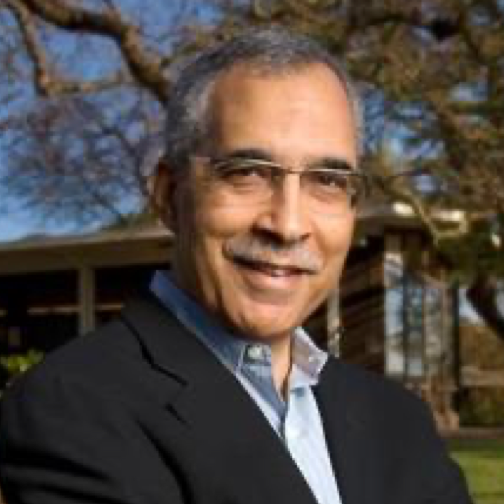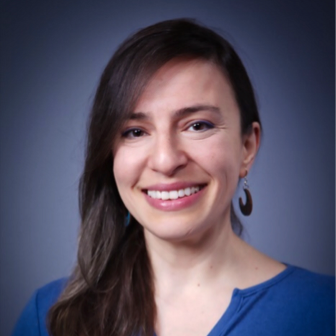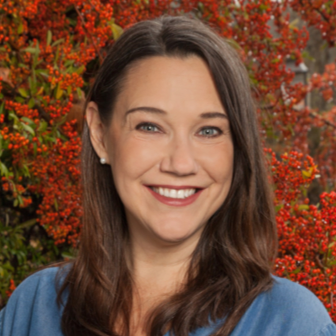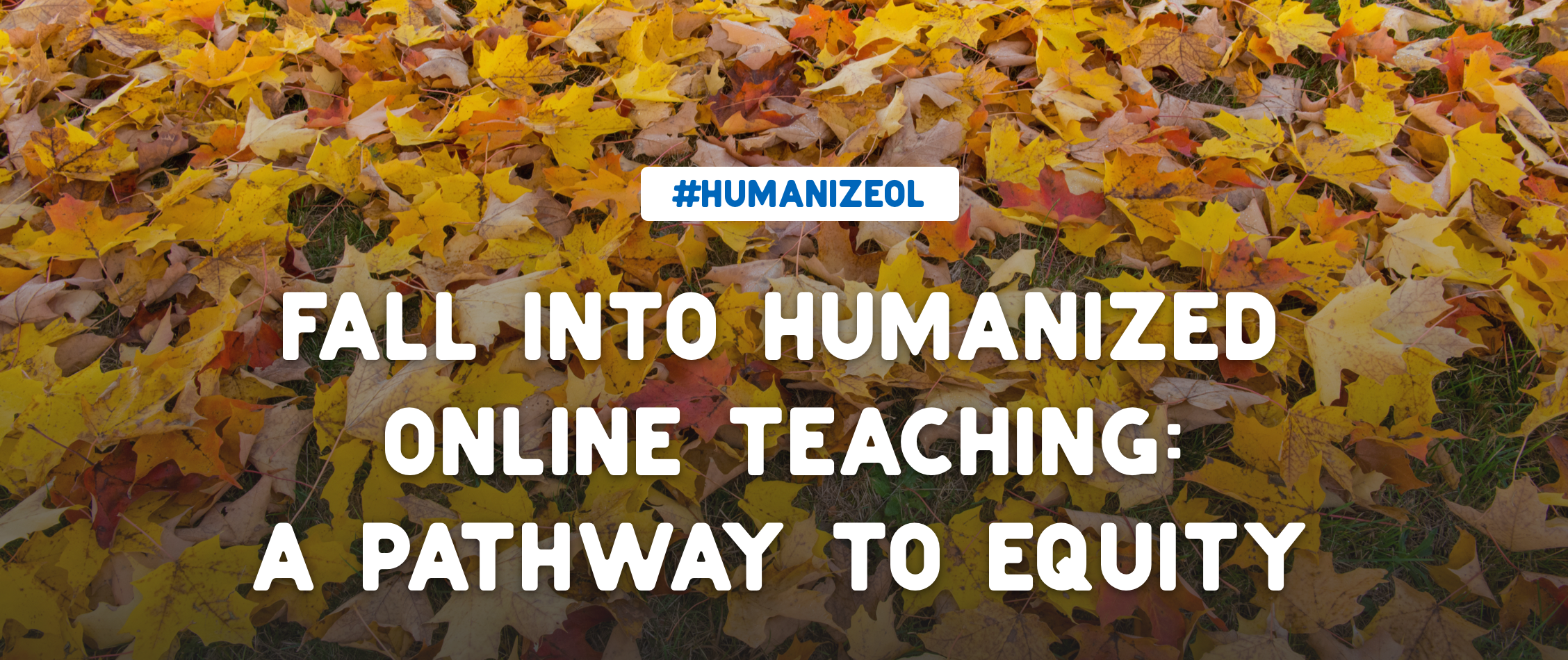This fall, join the California Virtual Campus and Online Network of Educators for a professional development series that will prepare you to design and teach more equitable online classes – Fall into Humanized Online Teaching: A Pathway to Equity. Increasing the inclusivity of online courses is an important part of improving student outcomes and closing equity gaps. Prior to COVID, more than 28 percent of total student headcount in the California Community College system was generated by online courses. Now online courses are part of every faculty member’s teaching and every student’s academic pathway. This series will help you create online courses you are proud of, foster trust, and challenge your students to achieve their full potential.
This series will help you create online courses that you are proud of, foster trust, and challenge your students to achieve their full potential
Through a series of live events, the CVC’s Michelle Pacansky-Brock will guide you through the creation of eight research-based humanized online teaching elements that will mitigate threats that contribute to equity gaps in online courses. You will be more prepared to design and teach inclusive online classes that welcome all students, value diversity as an asset, and leverage human presence to cultivate identity safety in the online environment. The series begins September 10, 2021.
By completing this series, you will be able to:

Improve belonging and community in online courses;

Create engaging instructional videos and other visually-oriented course materials that support the affective and cognitive dimensions of learning;

Improve inclusion and build trust online by decentering cues of power and oppression at play in your course materials and communications;

Mitigate cognitive underminers (stereotype threat, belongingness uncertainty, and imposter syndrome) in weeks zero to two, a high opportunity zone, with kindness cues of social inclusion;

Design warm asynchronous online activities that foster student-student interaction as well as metacognition, growth mindset, and self-efficacy; and

Develop the digital fluency and embrace vulnerability as you cultivate your imperfect teaching and social presence online
Featured Speakers

Dr. Claude Steele
Presenting on September 10thClaude M. Steele is an American social psychologist and a Professor of Psychology at Stanford University. He is best known for his work on stereotype threat and its application to minority student academic performance. His earlier work dealt with research on the self (e.g., self-image, self-affirmation) as well as the role of self-regulation in addictive behaviors. In 2010, he released his book, Whistling Vivaldi and Other Clues to How Stereotypes Affect Us, summarizing years of research on stereotype threat and the underperformance of minority students in higher education.

Dr. Mays Imad
Presenting on October 8thDr. Mays Imad is a neuroscientist and professor of Pathophysiology and Biomedical ethics at Pima Community College, the founding coordinator of Pima Community College’s the Teaching and Learning Center (TLC), and a Gardner Institute Fellow. Dr. Imad’s current research focuses on stress, self-awareness, advocacy, and classroom community, and how these impact student learning and success. Through her teaching and research she seeks to provide her students with transformative opportunities that are grounded in the aesthetics of learning, truth-seeking, justice, and self-realization.

Dr. Michelle Pacansky-Brock
Your guide throughout the seriesMichelle's work has helped online instructors across the world understand how to craft relevant, humanized online learning experiences that support the diverse needs of college students. In her current role as Faculty Mentor for the California Community Colleges CVC-OEI/@ONE, she coordinates professional development in support of quality, inclusive online teaching and learning and is leading an intersegmental California Education Learning Lab grant project that is examining the impact of online faculty development and humanized online teaching on diverse students in undergraduate online STEM courses in California.
Attendance Options: Choose your professional learning pathway
This series is designed with maximum flexibility, providing you with options to support your individualized goals.
A la Carte Attendance (Free!)
Register for and attend as many live sessions as you’d like for free. And if you have a conflict, no worries! All session archives will be shared publicly on the CVC-Online Network of Educators website.

Earn a Digital Badge from CVC ($150)
Register for and attend all sessions and create the eight humanizing elements for your online course. This will involve self-enrolling in our supplemental course, completing assignments independently, and applying feedback from members of the @ONE team. If you choose this option, you may also register to earn one continuing education unit (CEU) for an additional fee. Enrollment in the digital badge option has been closed.
Schedule
Week 1: Friday, September 10
9:00 AM -10:00 AM:
![]() The Science of a Diverse Community, Dr. Claude Steele
The Science of a Diverse Community, Dr. Claude Steele
Request access to the recording
Drawing on stereotype threat and social identity threat research, this talk will address the why, what and how of diverse learning communities: why they are important, a working hypothesis about what is critical to their success and what research reveals about how to achieve that success. The talk’s practical aim is to identify features of diverse learning communities—schools, universities and academic disciplines—that while good for all students, are especially helpful for minority students generally, and for women in STEM fields. The talk will also explore the psychological significance of community and its role in learning.
10:30 AM - 12:00 PM:
Humanizing Pre-course Contact with a Liquid Syllabus
View the recording
Improving the tone of your syllabus is a well known equity practice. Developing a Liquid Syllabus, a visually-oriented, public, accessible web page topped with a brief, imperfect welcome video that prepares students for a successful first week in an online course is next level! By the end of our session, you’ll get started with creating your own Liquid Syllabus using Google Sites, which will break down the instructor-student hierarchy and begin to build trust with your students.
Week 2: Friday, September 24
10:30 AM - 12:00 PM:
Laying out the Welcome Mat with a Humanized Course Card
and Homepage
View the recording
An online course, like any other course, is a social environment that can be experienced as a threat landscape by students. Racism, poverty, and social marginalization shape the way students respond to the cues in your course. This workshop will guide you through creating a course card and homepage mitigate threat by minimizing their cognitive load and sending cues of safety.
Week 3: Friday, October 8
9:00 AM - 10:00 AM:
![]() Bearing Witness as an Act of Love, Dr. Mays Imad
Bearing Witness as an Act of Love, Dr. Mays Imad
View the recording
In this session we will briefly consider the neuroscience of toxic stress and its impact on our ability to engage, connect, and learn. How will we welcome our students and colleagues to our institutions and classrooms this fall? What can we, educators, possibly do to help attend to their mental health and ameliorate their exhaustion and distress, while at the same time, intentionally engaging in self-care? We will examine the principles and practical examples of trauma- informed approaches and reflect on the connections between trauma-informed education, healing, and restorative justice.
10:30 AM - 12:00 PM:
Identifying Your High Opportunity Students with a Getting to
Know You Survey
View the recorindg
Humanized online teaching requires you to understand your students as more than just names on a screen. Developing awareness of their needs will enable you to teach with empathy. By the end of this workshop, you will import and adapt an existing survey into your Canvas course, which will help you get to know your students as real people. You will learn how to leverage this data to adapt your teaching and support your high opportunity students.
Week 4: Friday, October 22
10:30 AM - 12:00 PM:
Being a Warm Demander: Challenging Students with
Relationship-Rich Teaching and Wise Feedback
View the recording
You will acquire an understanding of warm demander pedagogy (Kleinfeld), which will empower you to leverage your relationships with your students to challenge them through push and care. You will learn how to construct wise feedback with growth mindset language and deliver it through video to support your students in achieving their full intellectual potential.
Week 5: Friday, November 5
10:30 AM - 12:00 PM:
Changing Students’ Learning Narratives with a Self-
affirming Ice Breaker and a Wisdom Wall
View the recording
Psychology research has shown that small teaching interventions can have a big impact on how students think about their learning. Changing that narrative can be a gamechanger. This session will provide an overview of this research and guide you through the creation of either a Wisdom Wall or self-affirming ice breaker using either Flipgrid or VoiceThread, asynchronous voice and video discussion tools.
Week 6: Friday, November 19
10:30 AM - 12:00 PM:
Developing your Teaching Presence with Bumper Videos &
Microlectures
View the recording
Using asynchronous video to teach your students new concepts is a fundamental online teaching skill. Videos construct your presence in your students’ learning and support their variability by empowering them to view and review content to support their unique rhythm without judgement from others. But long videos don’t work. We have solutions that we think you’re going to love! Bumper videos are visually oriented, 2-3 minute videos set to music that are not only engaging to watch, but also easy and fun to make! Microlectures are laser-focused instructional videos that are between 5-10 minutes long. You’ll be guided through an accessible video workflow using Adobe Spark or Screencast-o-Matic or Canvas Studio (you choose!) to create accessible videos and embed them in your Canvas course.

